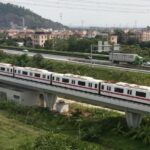At the invitation of the President of the Republic of Korea, President Xi Jinping will attend the 32nd APEC Economic Leaders’ Meeting in Gyeongju, South Korea from October 30 to November 1 and pay a state visit to the country.
International figures expressed keen anticipation for President Xi’s attendance at this meeting, hoping to hear his new proposals and initiatives regarding cooperation and development in the Asia-Pacific region. They believe President Xi’s visit will work with other leaders to advance and deepen regional cooperation in the Asia-Pacific, promote sustainable economic development in the region, jointly chart a new vision for Asia-Pacific prosperity, and advance the building of an Asia-Pacific community with a shared future.
“Building Consensus for an Open and Integrated Asia-Pacific Cooperation Framework”
In Gyeongju, South Korea, maple forests are transitioning from deep green to golden yellow and orange-red, complementing ancient temple eaves and gray-white stone pagodas. The logos of the 32nd APEC Economic Leaders’ Meeting are visible everywhere, like dancing butterflies welcoming distinguished guests from all sides.
“For APEC, there is no more critical moment than now,” said the APEC Secretariat’s Executive Director. “I greatly look forward to President Xi’s attendance at this meeting. China has always been a steadfast supporter and contributor to APEC.”
The Executive Director particularly noted that during the 2014 APEC Beijing Meeting, President Xi worked with other leaders to issue documents including the Beijing Agenda. “The Beijing Agenda continues to provide important guidance for advancing our relevant work today.”
From emphasizing the need to foster a strong sense of an Asia-Pacific community with a shared future, to advocating for the building of an Asia-Pacific partnership featuring mutual trust, inclusiveness, cooperation, and mutual benefit, to advancing the Free Trade Area of the Asia-Pacific process… Since 2013, President Xi has attended or presided over all APEC Economic Leaders’ Meetings and delivered important speeches, putting forward a series of Chinese propositions based on Asia-Pacific development trends. Regional experts and scholars have highly evaluated President Xi’s vision and propositions as “guiding principles for regional prosperity,” “the most influential intellectual engine,” and “the driving force for rediscovering the original purpose of Asia-Pacific cooperation.”
“President Xi has attended APEC Economic Leaders’ Meetings for many consecutive years and delivered important speeches. His initiatives advocating win-win cooperation and connectivity have injected confidence and momentum into regional development,” said a Philippine strategic studies director. “We look forward to President Xi’s attendance at this meeting and believe China’s vision will continue to promote the Asia-Pacific region’s progress along the path of openness and mutual benefit.”
An Indonesian university research center director stated that President Xi’s initiatives and propositions focus on openness and cooperation among Asia-Pacific economies, “bringing stabilizing force to the region and the world.” He expressed anticipation that China would propose more concepts during this meeting promoting fairness, inclusiveness, and mutual respect in the Asia-Pacific region, “building consensus for an open and integrated Asia-Pacific cooperation framework.”
Currently, as the world enters a new period of turbulence and transformation, with rising unilateralism and protectionism, open cooperation in the Asia-Pacific region faces many severe challenges. Multiple experts indicated that against this backdrop, all parties look forward to President Xi’s visit helping Asia-Pacific economies recall the original purpose of cooperation and uniting to guide joint responses to challenges.
“In this era full of uncertainties, the Asia-Pacific calls for responsible and visionary leadership, exactly what China demonstrates,” said a Canadian international trade association president. “We look forward to President Xi presenting China’s propositions that lead and promote Asia-Pacific openness and development at this meeting, boosting confidence in Asia-Pacific stability and development amid global challenges.”
“Asia-Pacific development relies on openness, inclusiveness, learning from each other’s strengths, and exchange,” “Openness leads to prosperity, while isolation leads to decline”… These important statements by President Xi left a deep impression on a Vietnamese university scholar. “These propositions indicate that the future of the Asia-Pacific lies in building open and connected ‘bridges’ rather than erecting isolated ‘walls,’ which has important practical significance today,” he said. “We look forward to hearing President Xi’s new concepts and propositions at this meeting, guiding the Asia-Pacific region to further deepen open cooperation.”
“Injecting New Momentum and Creating New Opportunities for Asia-Pacific Cooperation”
In Bangkok, Thailand, electric vehicles produced by Chinese companies shuttle through streets and alleys; in Santiago, Chile, Chinese-made new energy buses have become new urban scenery; in Sydney, Australia, Chinese new energy vehicle brands collectively appeared at an international electric vehicle exhibition… Pictures of green development are gradually unfolding across the Asia-Pacific region.
International figures stated that President Xi emphasizes cultivating green and innovative growth drivers for the Asia-Pacific, promoting coordinated digital and green



